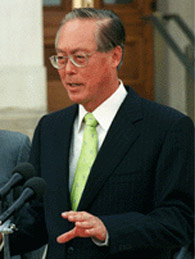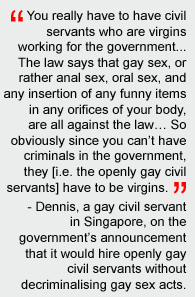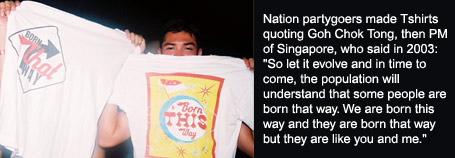Fridae is a proud sponsor of the Sexualities, Genders, and Rights in Asia: 1st International Conference of Asian Queer Studies to be held in Bangkok from 7-9 July 2005. Christopher Tan will present his paper "Pinking the Lion City: Interrogating Singapore's Gay Civil Servant Statement" at the conference.
On 4 July 2003, Singapore's former Prime Minister Goh Chok Tong dropped a small bombshell of an announcement in the main local newspaper The Straits Times. He declared, "In the past, if we know you're gay, we would not employ you. But we just changed this quietly." Now, the government will employ gay Singaporeans in "certain positions," even sensitive ones, provided that these civil servants openly declare their sexual orientation. Expecting considerable indignant resistance from the conservative quarters, Goh attempted to placate them: "We are born this way and they [i.e. gay people] are born that way, but they are like you and me."

Goh's statement caught everyone by surprise. As National University of Singapore sociology lecturer Dr Laurence Wai-Teng Leong writes, "Singapore appears to be the last frontier in the Asian region for positive gay and lesbian developments." Even though repression (along with sexual perversion) is characteristic of orientalist discourses, Leong's assertion is not entirely ungrounded. Although same-sex acts have already been decriminalised elsewhere in the British Commonwealth - Britain and Australia did so in 1967 and 1975 respectively - they are still chargeable offences in Singapore under Sections 377 and 377A of the Penal Code. These two statutes target unnatural offences and gross indecency respectively, with the life sentence as the maximum penalty.
Sections 377 and 377A are seldom evoked nowadays, but the range of acts that can be construed as "unnatural offences" is very broad. It includes but is not limited to rape, consensual fellatio and anal sex. Like "unnatural offences," "gross indecency" is equally undefined. However, court cases resulting from police sting operations carried out in the late 1980s and early 1990s gave it precedent for including oral sex between men, mutual masturbation and touching the genitals of another male.
The worst of these operations was carried out in March 1992 at the popular cruising grounds at the East Coast Parkway beach. The consequences of the raid went far beyond the monetary fine that was slapped on each of the eight arrested men. One of the four men whose incriminating picture was published felt so ashamed that he committed suicide. Also of note in the legal system is the fact that lesbians were never convicted. While Section 377 targets both heterosexual and homosexual couples, Section 377A applies specifically to men. The courts too have only punished men for same-sex acts. The impact of the legal omission of lesbianism goes beyond court cases. Leong writes: "The legal omission of lesbianism amounts to the symbolic annihilation of lesbians: officially, lesbians do not exist in Singapore. Silence, or the absence of discourse on lesbianism is no better than the legal oppression of male homosexuality: it is representative in itself by way of denying the existence of another form of human sexuality, thought and behaviour."
Sections 377 and 377A also provide the legal basis for the strict suppression of positive gay representation in traditional media through a series of guidelines that the Media Development Authority (MDA) administers. For example, the now defunct MediaWorks TV broadcasted an in-depth interview with Anne Heche in March 2003 that featured a significant discussion of the actress's life with Ellen DeGeneres. MDA subsequently found MediaWorks TV guilty of "[glamorising] the lesbian relationship between Anne and Ellen and [portraying] them as role models". It slapped the company with a hefty S$15,000 fine, even though the program was about Heche's life and hardly pornographic at all. Hence, even though the term "guideline" is by definition suggestive but not legally binding, the MDA guidelines are effectively rules that prevent the media from portraying homosexuality in a positive light.
As repressive as the media is, it took a radically opposite stance in the six weeks immediately following Goh's proclamation. Shortly before I left for the States for my doctoral studies on Aug 9 2003, the 6.30 pm news on the Mandarin-language Channel 8 featured a clip from a German gay pride parade. Although the clip lasted less than a minute, it was still significant because it was the first time that the language the announcer used was connotatively neutral. Instead of the pejorative tong xing lian (i.e. "same-sex passion"), the more refined tong xing ai (i.e. "same-sex love") was used. Tong zhi (literally "comrade" but used here as a euphemism for "gay") was also used in favor of the heavily pathologised tong xing lian huan zhe (i.e. "victim of the disease of same-sex passion").

For example, after asking the audience which of the three muscular, tight T-shirt-wearing men she had led out was gay, the hostess revealed that all three were in fact straight. The program also put a human face on what was previously an invisible group of social subalterns by featuring an unprecedented live interview with a gay man named Anthony. More interestingly, MediaWorks TV was not fined for OK, as it was for airing the Anne Heche interview. I can only surmise that the government held back the punishment because it had wanted to make the issue of gay civil servants more palatable to a homophobic public.
The gay-affirmative stance the government allowed the media to take was so radical that one must ask why the government had decided to acknowledge the gay presence. The answer has to do with Singapore's failing economy in the recent years. As Simon Elegant notes in his June 2003 article in Time Asia entitled "The Lion in Winter," Singapore experienced a record 4.4 percent unemployment rate in 2002. To successfully restructure the economy to focus on the more profitable financial services and specialised and high-tech areas like medical care and biotechnology, the economy needs a creative and entrepreneurial workforce with the ability to take risk. Here, Singapore faces two problems.
Firstly, Singaporeans have so far refused to heed the government's calls for earlier marriages and more babies, even as the birthrate hit an all-time low of 1.7 percent in 2003. Secondly, in a country that Cherian George has likened to an "Air-conditioned Nation" where the environment has been designed for the comfort of its inhabitants, the desire to take risk is in short supply.
One solution to all of the above problems, in the short-term at least, is attracting more foreign talent to migrate to Singapore. However, if Singapore is the notoriously puritan country that it is thought to be, then how can it convince foreign talent to settle there? By correlating the wealth of certain American cities to the concentration of gay couples found there, Florida came to the conclusion that the key to attracting talent is tolerance. The Straits Times explains: "The idea is simple: Tolerance creates an open, diverse society that welcomes everybody, whether mavericks or buttoned-down conservatives. This milieu attracts the kind of innovative, creative talent critical to economic growth� Professor Florida singles out gay-friendliness as an indicator of tolerance. 'To some extent, homosexuality represents the last frontier of diversity in our society and, thus, a place that welcomes the gay community welcomes all kinds of people.' Just as industries should have low entry barriers to allow new companies to enter and compete, so cities should have low entry barriers to people, so newcomers of all stripes are accepted quickly into social and economic arrangements. 'Openness to the gay community is a good indicator of the low entry barriers to human capital that are so important to spurring creativity and generating high-tech growth.'"
By employing openly gay civil servants, the government hopes that a gay-tolerant culture will take root within the public sector. Having nominalised trangressive homosexuality, this will in turn encourage private companies and eventually the rest of Singapore to follow suit. With luck, foreign talent will find Singapore attractive enough to settle there and help buttress the economy in case conditions turn gloomy again in the future. This will keep Singaporeans happy and the PAP in power.
Despite its message of tolerance, the gay civil servant statement is in reality an economic discourse. When The Straits Times made public the government's intention to hire gay civil servants, it did so four days after Goh broke the news to the internationally read Time Asia.
Since Vivian Balakrishnan, the government official in charge of the Remaking Singapore Committee, had also made it clear in the Time Asia article that "Singapore will do 'whatever it takes' to attract talent," Goh's gesture can only be read as the government seeing sexual diversity as a necessary evil because it is unwilling to turn away any foreign talent who happens to be gay.

As an activist from the local gay rights advocacy group People Like Us, Lee also thought that the statement was "a good thing for us, as a group of activists from PLU. That was like a springboard for us to jump from, to bring it further."
Kelvin Wong, another PLU activist, agreed as he acknowledged that PLU can only push for more equal rights when the government signals its permission to do so. Any unruly behaviour otherwise would land the activists in the police station as troublemakers not to be publicly associated with. Hence, Goh's statement emboldened PLU to once again submit its application to register formally as a society. Like its predecessor, this second application was also rejected.
Other evidence, when considered in tandem with this second rejection, suggests strongly that Goh's statement was nothing more than what Singaporeans would call a wayang. Originally a Malay word meaning "performance" (as in wayang cina, or Chinese opera), wayang is now used to denote something that has more bells and whistles than actual substance.
Firstly, any real impact the statement might have had is effectively curtailed by the fact that gay Singaporeans already worked as civil servants even before the statement was made. All four of the gay civil servants in my informant pool were employed before 2003, and none of them reported that they felt particularly discriminated against because of their sexual orientation. In fact, one had even attained a position of some sensitivity as a staff sergeant in the army despite having outed himself selectively to his colleagues and immediate superiors.
Secondly, some of my informants also commented that the statement would never be fully tenable as long as same-sex acts remain criminalised. Since gay Singaporeans are by legal definition lawbreakers, the government would have knowingly retained the services of criminals if it employed openly gay citizens. As he pointed out this irony, Dennis quipped: "You really have to have civil servants who are virgins working for the government... The law says that gay sex, or rather anal sex, oral sex, and any insertion of any funny items in any orifices of your body, are all against the law� So obviously since you can't have criminals in the government, they [i.e. the openly gay civil servants] have to be virgins."
Lastly, the government does not seem to have the will to carry through with the statement. I had started my fieldwork calling the statement a "policy," but Lee corrected me of my mistake. She reminded me that what Goh had announced was never passed into law. Without legal protection, how can the government expect closeted civil servants to risk their jobs by coming out? In fact, it is still unclear as to what exactly the "certain sensitive positions" that Goh promised gay Singaporeans are referring to. Furthermore, when I asked the civil servants in my informant pool whether their individual ministries or statutory boards had done anything to realise the statement, the answer was a uniformly resounding "no."
In conclusion, even though it was hailed as the first step towards more equal rights for gay Singaporeans, the gay civil servant statement of 2003 is nothing more than an embellishing discourse designed to make Singapore appear more attractive to potential immigrants.
Despite the criticisms that have been levelled at the statement however, I feel that the situation for the struggle for more equal rights is not as depressing as it seems. While it is certain that not all Singaporeans will welcome the advancement of equal rights, most of them will not explicitly register their resistance as long as it does not affect them directly in an adverse manner.
Furthermore, with more and more countries recognising gay rights, Singapore's leaders know that it will be suicidal to ignore the global trend and remain homophobic. Ultimately, the same pragmatism that guided the PAP into promising to accept openly gay civil servants will make Singapore a better place for all gay people living there.
Christopher Tan is doctoral student at the University of Illinois in the United States. He will be presenting his paper "Pinking the Lion City: Interrogating Singapore's Gay Civil Servant Statement" at the Sexualities, Genders, and Rights in Asia: 1st International Conference of Asian Queer Studies to be held in Bangkok from 7-9 July 2005. He can be contacted at koktan@uiuc.edu.












 打印版本
打印版本










读者回应
抢先发表第一个回应吧!
请先登入再使用此功能。